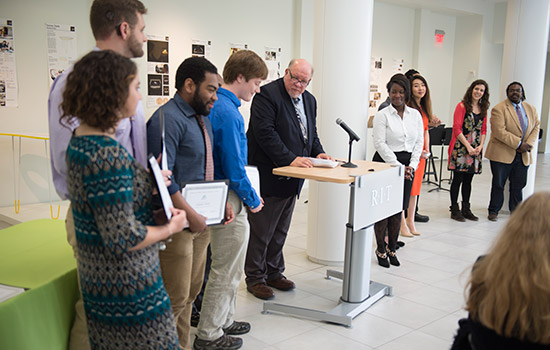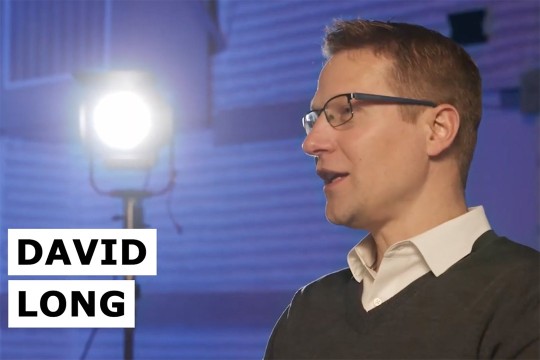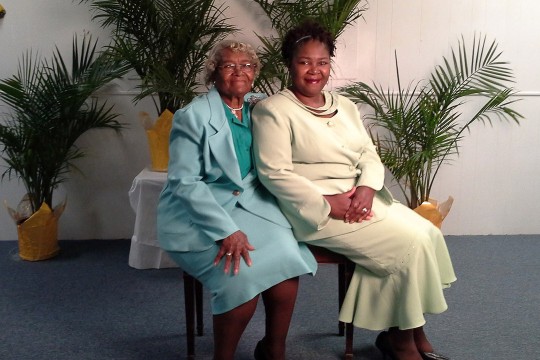RIT honors criminal justice majors
Speaker says attitudes towards criminal justice and crime prevention are changing
Ryan Flanagan
Several RIT criminal justice majors were recognized Friday for leadership and success by John Klofas, director of RIT’s Center for Public Safety Initiatives.
Attitudes towards criminal justice and crime prevention strategies are changing, said Denise O’Donnell, former U.S. Attorney and director of the Bureau of Justice Assistance at the Office of Justice Programs with the U.S. Department of Justice.
O’Donnell made her remarks Friday at Rochester Institute of Technology, where she received the Contributions to Justice Award and was keynote speaker at the Senior Luncheon and Recognition Celebration put on by RIT’s Department of Criminal Justice and Center for Public Safety Initiatives.
The event also recognized 18 RIT criminal justice majors.
Criminal Justice Chairperson John McCluskey welcomed the students, faculty, staff and guests, and he noted that the world is so different from just 20 years ago.
“The world you’re going out into has changed,” he said. “The questions you have wrestled with in class are the same questions you will wrestle with in your careers.”
O’Donnell believes there is “a real renaissance in criminal justice thinking. There really is a thirst for new ideas and approaches and the desire to evaluate what we are doing in criminal justice.”
She said there is also a growing belief that crime and recidivism can be reduced and prevented through approaches that have proven to work.
“And there is increasing acceptance by criminal justice practitioners that it is our responsibility to embrace research and science and data and technology in our work,” she said.
Such thinking is a change from not so long ago, when “public safety partners largely reacted to crime, and the notion of us being held responsible for reducing it or for pursing innovation was really an entirely foreign idea. Fortunately that is no longer the case,” O’Donnell said.
She called the advent of police accountability programs and the growing number of public safety practitioners and criminologists willing to try new strategies an evolution in policing.
“I don’t want to imply that we don’t have serious issues in front of us as we move forward,” O’Donnell said. “For the past several years we have witnessed heartache in the form of senseless shootings of innocent police officers, the police shootings of unarmed citizens, documentation of patterns and practices of civil rights violations in police departments and correctional facilities, and the toll that stop and frisk policies has had in many our communities of color, and more. We have similarly experienced a serious breakdown of trust between law enforcement and many of the communities they serve. But I’m encouraged that the public safety community has recognized that community support is essential to achieve the goals of a safe community.”
O’Donnell said she is optimistic more attention will be paid to data-driven research showing what prevention programs are effective. That is much of the work being done by RIT’s Center for Public Safety Initiatives.
“The efforts over the years here in Rochester and across the country have shown that we can be both tough on crime and smart on crime. But what we shouldn’t do is stop investing in research and science and ignore all that we have learned in the past decades about what works in criminal justice,” she said.
“Most of all, we should not ignore the most important lesson we have learned from the past: namely that we cannot merely arrest our way out of our crime problem.”
O’Donnell said there will be no shortage of work for criminal justice majors and although we have one of the best criminal justice systems in the world, there are countless ways to improve it.
“So for those of you who are starting or moving on in your criminal justice career, your work is more important now than ever before,” she said. “The future safety of our communities and the achievement in our nation’s promise of equal justice under the law lies in your hands. May you be guided by data and science, and continue to advance evidence-based solutions that make our communities safer, and our justice system more fair.”
The students honored include:
Thomas C. Castellano Award, for seniors with outstanding academic success:
- Cassandra Contreras, of North Platte, Neb.
- Jordan Gates, of Auburn, N.H.
- Ryan Lamon, of Dexter, N.Y.
- Tayler Ruggero, of Langhorne, Pa.
- Emily Welch, of Henrietta, N.Y.
Richard B. Lewis Award, for juniors with outstanding academic success:
- Arion Rivera, of The Bronx, N.Y.
- Shakierah Smith, of Rochester, N.Y.
- Michael Surtel, of Pittsford, N.Y.
Goffman Award, for a first-year student leader in academic and community activities:
- Jessica Burt, of Hamlin, N.Y.
Matthew Sullivan Memorial Scholarship:
- Delaney Beckhorn, a third-year student from Elmira, N.Y.
Shaw and McKay Award, for a master’s student who produced locally relevant research:
- Christopher Sweadner, of West Hartford, Conn.
Center for Public Safety Initiatives’ Excellence in Research Award:
- Jordan Gates, of Auburn, N.H.
- Shayna Gray, of Vestal, N.Y.
- James Herrmann, of Slingerlands, N.Y.
- Nathaniel Le Mahieu, of Hortonville, Wisc.
- Na Liu, of Rochester.
- Tayler Ruggero, of Langhorne, Pa.
- Sujeong Seo, of South Korea.
- Chaquan Smith, of New York City.
- Christopher Sweadner, of West Hartford, Conn.















